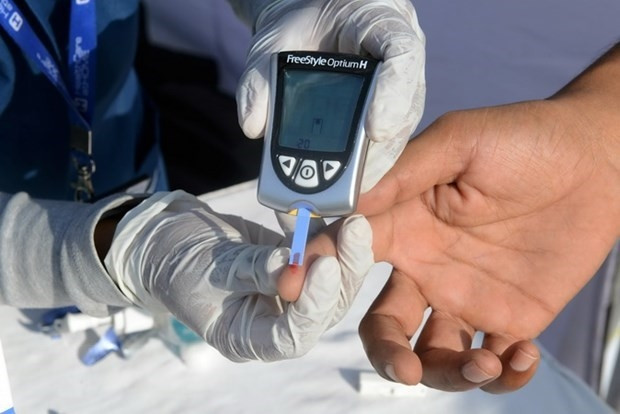Diabetes can cause serious chronic complications, affecting the heart, blood vessels, eyes, kidneys, nerves and teeth, increasing the risk of infections.

A medical worker takes a blood sample to test blood sugar from a patient at a medical center in Hyderabad.
Diabetes is a chronic disease that occurs when the pancreas does not produce enough of the hormone insulin to regulate blood sugar levels or when the body cannot effectively use the insulin it produces.
According to the latest announcement from the International Diabetes Federation (IDF), in 2021, an estimated 537 million adults (20-79 years old) worldwide are living with diabetes.
Diabetes is expected to cause 6.7 million deaths in 2021. That's 1 death every 5 seconds.
In Vietnam, the number of people with diabetes has reached over 3.5 million; it is forecast to increase to 6.3 million by 2045.
The rate of people with diabetes is increasing rapidly and getting younger. Many people between the ages of 25 and 30 have diabetes without knowing it.
Diabetes can cause serious chronic complications, affecting the heart, blood vessels, eyes, kidneys, nerves and teeth, increasing the risk of infections.
In most high-income countries, diabetes is the leading cause of cardiovascular disease, blindness, kidney failure and lower limb amputations.
Adults with diabetes have a two to three times increased risk of heart attack and stroke.
Diabetic retinopathy is a major cause of blindness due to the long-term buildup of small blood vessels in the retina. 2.6% of global blindness may be due to diabetes.
Diabetes is one of the leading causes of kidney failure.
During the COVID-19 pandemic, people with diabetes are at higher risk of getting COVID-19, getting more severe illness, and dying. At the same time, COVID-19 makes it difficult for people with diabetes to access or interrupt their regular treatment, leading to increased severity and dangerous complications of diabetes.
Cardiovascular complications: Prolonged high blood sugar levels affect the heart and blood vessels and can cause complications such as coronary artery disease (leading to heart attack) and stroke.
Cardiovascular disease is the most common cause of death in people with diabetes.
High blood pressure, high cholesterol, high blood glucose and other risk factors contribute to an increased risk of cardiovascular complications.
Kidney complications (diabetic nephropathy): caused by damage to the small blood vessels in the kidneys, leading to poor kidney function or kidney failure. Kidney disease is more common in people with diabetes than in people without diabetes.
Nerve complications (diabetic neuropathy) are common and often appear early in people with diabetes. Type 2 diabetes can cause nerve damage throughout the body when blood glucose and blood pressure are too high.
Symptoms in the limbs: numbness, loss of sensation or sensory disturbances, muscle atrophy, pain, malnutrition and ulcers due to malnutrition are risks of infection leading to amputation (removal of part of the limb)...
Cranial nerve damage can cause ptosis, strabismus, and facial paralysis.
Autonomic nerve damage can also cause myocardial infarction, bladder paralysis, impotence, digestive disorders...
Eye complications (diabetic retinopathy): persistently high blood sugar levels along with high blood pressure and high cholesterol can damage the retina, leading to reduced vision or blindness.
Increased risk of infection: high blood sugar is a favorable environment for bacteria to grow, and at the same time weakens the body's immune system, making it susceptible to infections such as dental, urinary or genital infections, slow-healing ulcers... Inflammation is often prolonged, persistent and difficult to treat.
High blood glucose during pregnancy can lead to the fetus being overweight. This can easily lead to obstetric complications for the baby and mother; the risk of sudden hypoglycemia in the baby after birth.
Children exposed to high blood glucose during pregnancy have a higher risk of developing diabetes later in life than other children.
In addition to the above complications, high blood sugar can also damage many other organs of the body such as bones, joints, brain, memory loss or skin diseases.
According to Vietnam+